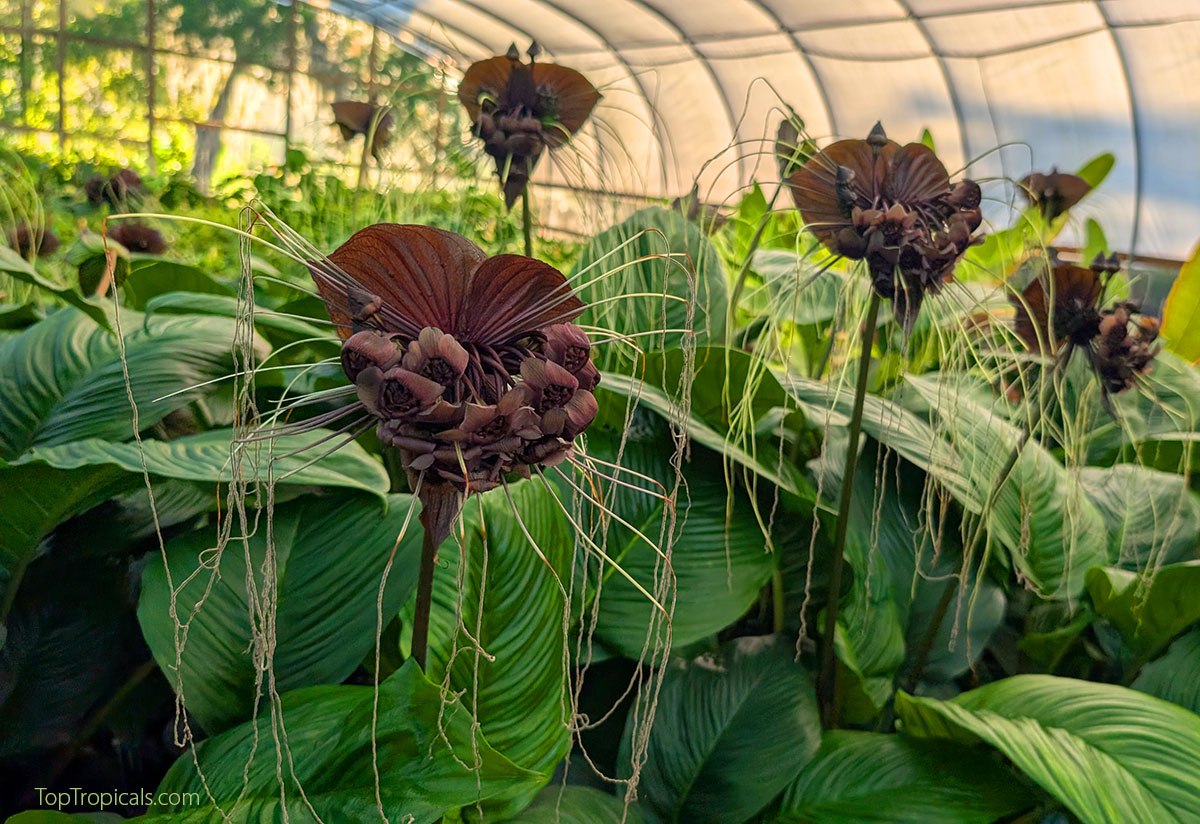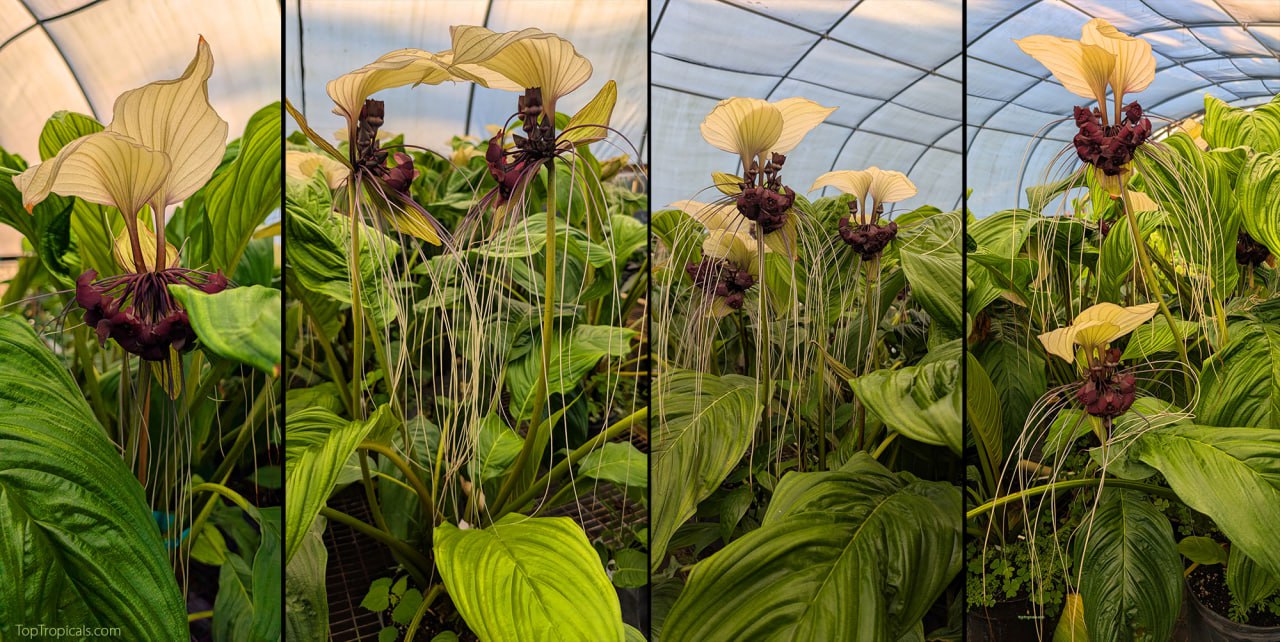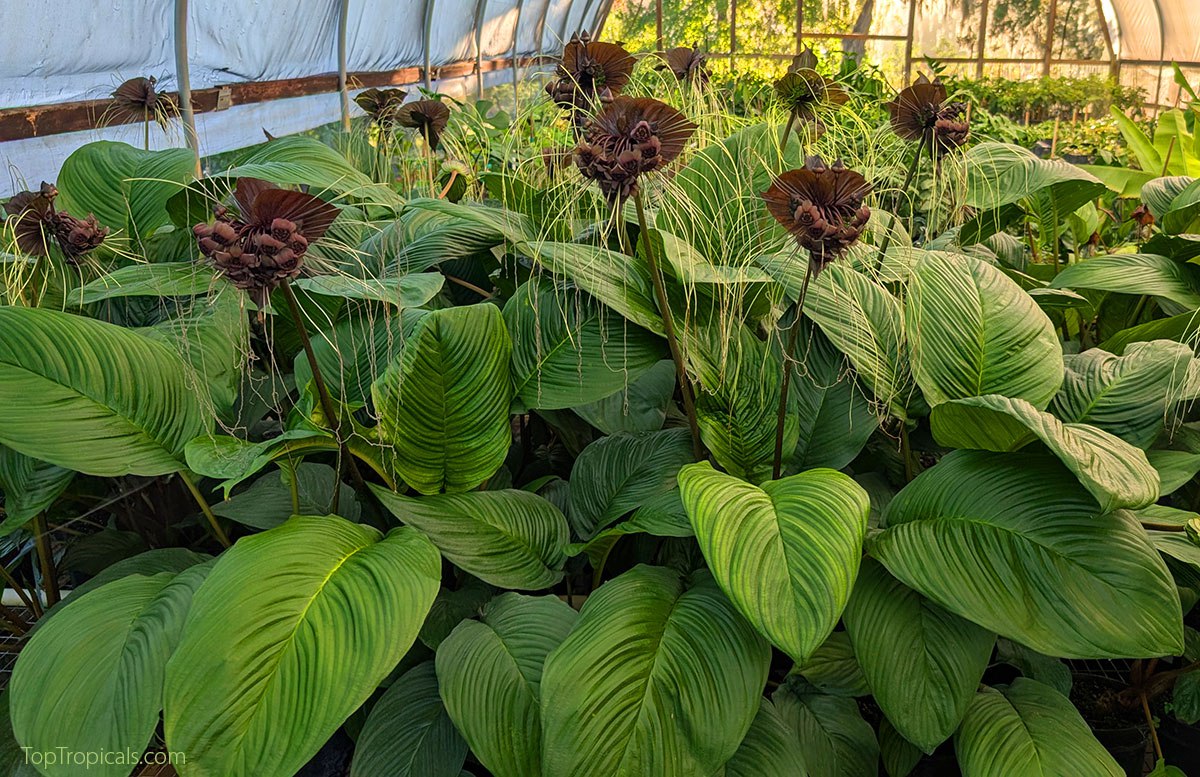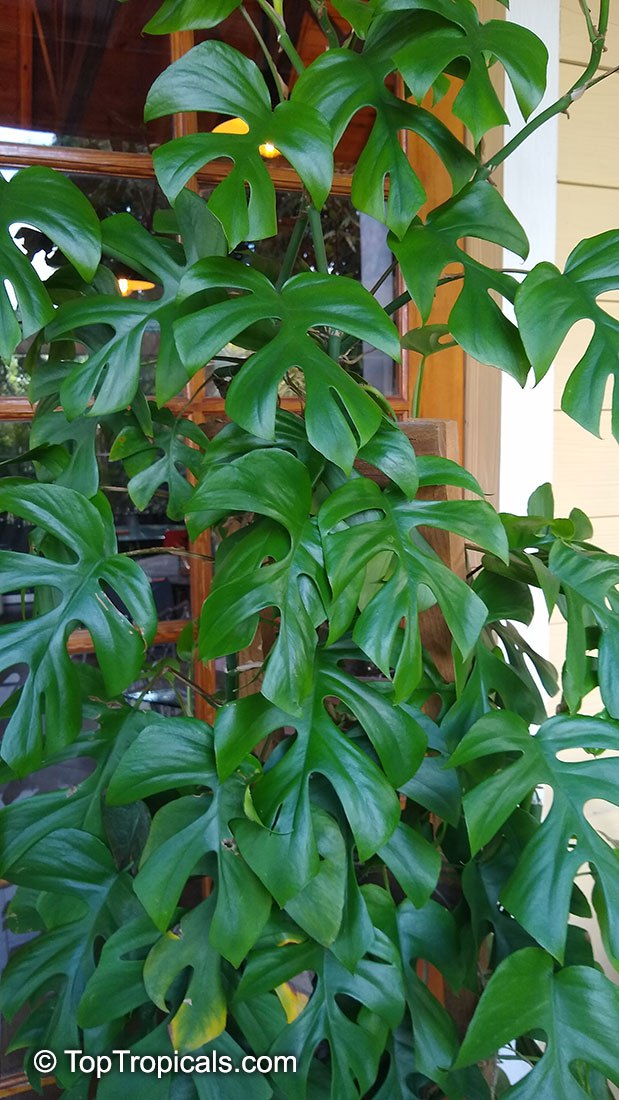Garden Blog - Top Tropicals
Why gardeners are swapping white Butterfly Ginger for this yellow giant
Hedychium flavum x coronarium, Yellow Butterfly Ginger, Nardo Ginger Lily
Why gardeners are swapping white Butterfly Ginger for this yellow giant
Hedychium flavum x coronarium, Yellow Butterfly Ginger, Nardo Ginger Lily - this variety grow fast and much bigger and vigorous than classic White Butterfly Ginger. More flowers - more fragrance!
What makes it especially nice:
🛒 Plant Perfumed Butterfly Ginger
📚Learn more:
#Shade_Garden #Perfume_Plants
🟢 Join 👉 TopTropicals
Hedychium flavum x coronarium, Yellow Butterfly Ginger, Nardo Ginger Lily - this variety grow fast and much bigger and vigorous than classic White Butterfly Ginger. More flowers - more fragrance!
What makes it especially nice:
- If you love fragrance in your garden, this plant delivers - the scent from the flower spikes can be wonderfully strong in warm evenings.
- The yellow-toned flowers are a subtle variation on the classic white butterfly ginger, so you get the same delightful form and perfume but with a twist of color.
- Bold foliage gives a tropical look - great for adding height, texture and a sense of lushness.
- Because it grows somewhat larger and more vigorous, it can create a dramatic feature rather than just a filler plant. Make sure you have enough room, especially if planted near other plants.
- Because the flowers last only a day each (in the white butterfly ginger, each flower lasts about one day) according to one source, you’ll see new blooms and old blooms in succession rather than long-lasting individual flowers.
- This yellow-butterfly ginger hybrid ticks all the boxes of a showy, fragrant, tropical-style plant with personality. Give it the space, moisture and good soil it craves, and you’ll be rewarded with lush leaves and clusters of softly yellow, scented blooms that draw in attention - and sniffers - all summer long!
🛒 Plant Perfumed Butterfly Ginger
📚Learn more:
#Shade_Garden #Perfume_Plants
🟢 Join 👉 TopTropicals
Tacca wants to be a cat! And everyone loves cats!
🐈⬛ Tacca wants to be a cat! And everyone loves cats!
That’s probably the real evolutionary secret no botanist will admit! Those whiskers? Pure marketing genius from nature.
Cats had it figured out first — look mysterious, add long elegant whiskers, and everyone falls in love.
Tacca just took notes and said, “Alright, I can work with that!”
So now we have a tropical plant that looks half orchid, half bat, and just enough cat to make people stop, smile, and want one for their collection!
Tacca nivea - White Tacca
Tacca chantrieri - Black Tacca
Tacca leontopetaloides - Green Tacca
📚 Learn more:
🛒 Add Taccas - Bat Lilies to your collection
#Container_Garden #Shade_Garden #Nature_Wonders
🟢 Join 👉 TopTropicals
That’s probably the real evolutionary secret no botanist will admit! Those whiskers? Pure marketing genius from nature.
Cats had it figured out first — look mysterious, add long elegant whiskers, and everyone falls in love.
Tacca just took notes and said, “Alright, I can work with that!”
So now we have a tropical plant that looks half orchid, half bat, and just enough cat to make people stop, smile, and want one for their collection!
Tacca is also called the Bat Lily or Devil Flower. This tropical wonder grows bat-shaped wings and foot-long whiskers. The black form (Tacca chantrieri) looks straight out of a gothic dream, while the white one (Tacca nivea) is ghost-like and elegant.
Some of our plants are blooming right now in the nursery — true Halloween magic! Blooms are delicate and may not travel, but the plants are strong and will flower again soon in your care.
Tacca colors: Black, White, Green:
Tacca nivea - White Tacca
Tacca chantrieri - Black Tacca
Tacca leontopetaloides - Green Tacca
📚 Learn more:
- ▫️The mystery of the White Bat Lily - the plant with wings and whiskers
- ▫️ A flying bat with whiskers
- ▫️ The rarest Green Tacca - Tacca leontopetaloides
- ▫️ When Bat Head Devil Flower is in bloom
- ▫️ Bat Head - Devil Flower
🛒 Add Taccas - Bat Lilies to your collection
#Container_Garden #Shade_Garden #Nature_Wonders
🟢 Join 👉 TopTropicals
Weird cactus looks like pasta with Dragon Fruit
Epiphyllum guatemalense Monstrosa - Curly Locks or Orchid Cactus
👀 Weird cactus looks like pasta with Dragon Fruit
🛒 Add Curly Locks to your rare plant collection
📚 Learn more:
Botanical bedhead: curly, crazy, and full of surprises
#Fun_Facts #Container_Garden #Shade_Garden #Nature_Wonders
🟢 Join 👉 TopTropicals
- ➰ Epiphyllum guatemalense Monstrosa - Curly Locks or Orchid Cactus - is one of the most unusual jungle cacti you can grow. Instead of the usual flat cactus leaves, this one grows curly, looping stems that twist and spiral in every direction. It looks like a green waterfall of botanical noodles, perfect for a hanging basket or a high shelf where its wild shape can really show off.
- ➰Curly Locks is actually a natural mutation of a Guatemalan jungle cactus that grows high up in jungle trees, using its stems to absorb moisture and light from the air. Like many epiphytic cacti, it produces large, fragrant flowers that open at night and look strikingly similar to orchids. After blooming, it forms small, oval pink fruits that are edible and juicy - like tiny dragon fruits!
- ➰This plant is self-pollinating, so you don’t need insects or hand pollination to get fruit. It thrives in bright, indirect light and prefers to be a bit root-bound to trigger blooming. Just water moderately, let the soil dry slightly between waterings, and avoid moving it too often once it’s happy in its spot.
- ➰Epiphyllum Curly Locks is not your typical cactus - it’s a living sculpture, a conversation piece, and a fruiting wonder all in one.
🛒 Add Curly Locks to your rare plant collection
📚 Learn more:
Botanical bedhead: curly, crazy, and full of surprises
#Fun_Facts #Container_Garden #Shade_Garden #Nature_Wonders
🟢 Join 👉 TopTropicals
Straight from the Amazon: the most beautiful ginger everyone asks about at our farm
Variegated Spiral Ginger - Costus arabicus (amazonicus)
⭐️ Straight from the Amazon: the most beautiful ginger everyone asks about at our farm
Now you can have it too - straight from the Amazon forest to your garden!
🛒 Get your own Amazon Ginger
📚 Learn more:
#Container_Garden #Shade_Garden
🔴 Join 👉 TopTropicals
- 🌀 Variegated Spiral Ginger - Costus arabicus (amazonicus) is not your average ginger. Unlike the common gingers with plain green leaves and short flower spikes, this one is a real standout. Its tall spiral stems are striped with bold white variegation, creating a dramatic swirl of green and cream even before it blooms.
- 🌀 And when it does bloom - the flowers are pure white with soft yellow centers, like porcelain sculptures nestled among the leaves. It's a tropical showpiece that turns heads wherever it grows.
- 🌀 Originally from South America and now loved in Hawaii and Florida, this ginger thrives in moist, rich soil and loves plenty of water. It handles both sun and shade, but really shines in a bright, filtered light spot.
- 🌀 We have one growing right by our farm office, and everyone who walks by stops, stares, and says the same thing: "I want that plant!"
Now you can have it too - straight from the Amazon forest to your garden!
🛒 Get your own Amazon Ginger
📚 Learn more:
- 💋The most spectacular variegated ginger
- 💋Ginger makes a natural shampoo
- 💋How Raspberry ginger became spiral
- 💋5 most spectacular Gingers
- 💋Spice Up Your Garden with Variegated Ginger
#Container_Garden #Shade_Garden
🔴 Join 👉 TopTropicals
Stop watering your Monstera on a schedule - here is what it really wants!
💦Stop watering your Monstera on a schedule - here is what it really wants!
📸 In the photo: Rhaphidophora tetrasperma - Mini Monstera, Dwarf Monstera Ginny, a rare collectible for plant enthusiasts.
🛒 Shop Monstera plants
📚 Learn more:
#Food_Forest #Container_Garden #Shade_Garden #How_to
🟢 Join 👉 TopTropicals
☘️ Monstera might look like a big diva, but it's actually one of the easiest houseplants to keep happy, according to the gardening experts from Southern Living.
☘️ The trick is not sticking to a strict watering schedule, but checking the soil. Water only when the top couple inches feel dry - usually every week or two in warm months and less in winter. Give it a good soak until water drains out the bottom, then let it dry again.
☘️ Too much water is worse than too little – soggy soil means root rot. Signs of overwatering include yellow or droopy leaves, dark spots, or gnats buzzing around. Underwatering looks similar, but the soil will be bone dry. When in doubt, check the dirt!
☘️ You can water from the top or let the pot sit in a shallow tray to soak from the bottom – just don’t let it sit in water. Bright, indirect light and a well-draining pot are your best friends. Keep that balance, and your Monstera will thrive for decades.
📸 In the photo: Rhaphidophora tetrasperma - Mini Monstera, Dwarf Monstera Ginny, a rare collectible for plant enthusiasts.
🛒 Shop Monstera plants
📚 Learn more:
- • Fruit growing on a house plant!
- • How to harvest and eat Monstera Ice Cream
- • How mini is Mini Monstera?
- • Holy Swiss Cheese Plant
- • Monstera x adansonii - Baby Swiss Cheese Plant
#Food_Forest #Container_Garden #Shade_Garden #How_to
🟢 Join 👉 TopTropicals
You wont believe what glows in the shade: the rare blue ginger
Dichorisandra thyrsiflora - Blue Ginger
💎You won't believe what glows in the shade: the rare blue ginger
🛒 Get your own exotic Blue Ginger
📚 Learn more:
Is Sapphire Gem really a ginger?
#Container_Garden #Shade_Garden
🟢 Join 👉 TopTropicals
- 💎 If you ever spot a flash of electric blue in the tropical shade, you might think your eyes are playing tricks on you, but that vivid color belongs to a rare Dichorisandra thyrsiflora - Blue Ginger.
- 💎 Despite its name, this isn’t a true ginger at all. It’s actually related to Tradescantia, the same family as familiar houseplants like the Wandering Jew and Spiderwort. Native to Brazil, Blue Ginger thrives in warm, humid shade, making it a perfect choice for patios, screened porches, garden corners, or indoor collections.
- 💎 Its glossy leaves and tall stems topped with clusters of sapphire-blue blooms create a tropical jewel effect. The flowers attract hummingbirds and butterflies, adding life and motion to shady areas where few other plants bloom so brightly.
- 💎 Give it rich, well-drained soil, steady moisture, and partial shade - and enjoy one of the rarest colors in the tropical plant world.
🛒 Get your own exotic Blue Ginger
📚 Learn more:
Is Sapphire Gem really a ginger?
#Container_Garden #Shade_Garden
🟢 Join 👉 TopTropicals
Why this Elephant Ear is breaking the internet: the hottest houseplant of the year
Alocasia macrorrhiza Variegata - Variegated Elephant Ears
Why this Elephant Ear is breaking the internet: the hottest houseplant of the year
🛒 Get yours before it’s gone or add to wishlist
📚 Learn more:
#Shade_Garden #Container_Garden
🟢 Join 👉 TopTropicals
- 🍀 This is Alocasia macrorrhiza Variegata - Variegated Elephant Ears - the tropical showstopper that collectors can’t stop talking about.
- 🍀 One look at those giant leaves splashed with creamy white and deep green, and you'll see why it's always sold out. Every leaf is different - some half white, some marbled like abstract art. Some leaves can be completely white!
- 🍀 Unlike most elephant ears, this one stays a bit more compact, which makes it perfect for a big decorative pot on a patio or shady corner. It still has that bold, jungle look but behaves better in containers.
- 🍀 Give it bright, filtered light, warmth, and humidity. Keep the soil moist but never soggy. The white parts of the leaves can burn easily, so skip harsh direct sun.
- 🍀 Here's a tip: if you see a solid green shoot, cut it off - it can take over and make the plant lose its variegation. That’s because this plant’s variegation is a chimera, meaning it can shift from leaf to leaf.
- 🍀 Feed it lightly during the growing season. The white parts can’t make food for the plant, so it relies on the green sections to do all the work. A little boost with Sunshine Robusta or Green Magic controlled release fertilizer help it stay balanced without overloading the roots.
- 🍀 This plant’s got everything: beauty, rarity, and a bit of mystery. No wonder it’s the one everyone wants to show off!
🛒 Get yours before it’s gone or add to wishlist
📚 Learn more:
- ▫️How can you use Elephant Ears?
- ▫️Charming Elephant Ears: Alocasia vs. Colocasia - which one is better?
- ▫️A Beautiful and Edible Delight: Colocasia antiquorum Illustris
- ▫️What to plant by the pond?
- ▫️Pharaoh Mask with stunning 3D effect
- ▫️Mojito Elephant Ears
- ▫️Colocasia vs Alocasia - what is the difference?
#Shade_Garden #Container_Garden
🟢 Join 👉 TopTropicals
Whats that fragrance in the dark?
Brunfelsia - Lady of the Night
🌠 What's that fragrance in the dark?
Popular species include: B. americana, B. isola, B. nitida, B. lactea, B. manaca, B. densifolia, B. gigantea.
Do you already grow Brunfelsia? What kind do you have in your garden?
🛒 Experience Brunfelsia fragrance
📚 Learn more about Brunfelsias:
#Perfume_Plants #Hedges_with_benefits #Container_Garden #Shade_Garden
🟢 Join 👉 TopTropicals
- 💐 Brunfelsia? People often ask: what can you plant in a shady spot that blooms year-round and smells amazing? The answer is Brunfelsia, known as Lady of the Night.
- 💐 This Brazilian beauty is a compact, shade-loving shrub that thrives in low light and rewards you with creamy white flowers. As the sun sets, the blooms release a sweet, unforgettable perfume that lingers through the night. It’s like nature’s way of setting the mood for evening strolls.
- 💐 Brunfelsia is more than just fragrance. Its flowers attract butterflies and hummingbirds, turning shaded corners into lively little stages. Low-maintenance, pollinator-friendly, and elegant, it’s the answer to your prayers: shade, flowers, and fragrance all in one plant.
- 💐 The most fragrant Brunfelsias are the creamy-white varieties, often called Lady of the Night.
Popular species include: B. americana, B. isola, B. nitida, B. lactea, B. manaca, B. densifolia, B. gigantea.
Do you already grow Brunfelsia? What kind do you have in your garden?
🛒 Experience Brunfelsia fragrance
📚 Learn more about Brunfelsias:
- ✦ Five best fragrant plants for summer plantings
- ✦ What is the most fragrant Brunfelsia?
- ✦ What happens when you cross Cream and Lavender?
- ✦ Lavender Marble Perfume
- ✦ What is the difference between Brunfelsia americana and nitida?
- ✦ Brunfelsia americana - Lady of the night
- ✦ Brunfelsias
#Perfume_Plants #Hedges_with_benefits #Container_Garden #Shade_Garden
🟢 Join 👉 TopTropicals
How to make lots of Insulin Ginger plants quickly and get more health benefits
Costus igneus (Chamaecostus cuspidatus) - Fiery Costus or Spiral Flag
💚 How to make lots of Insulin Ginger plants quickly and get more health benefits
🎥 In this video, we’ll show you how to multiply Insulin Ginger fast, so you’ll have plenty of plants for yourself and even extras to share with friends and family.
✅ Don’t forget to use Green Magic fertilizer for the best results. Gingers absolutely love this plant food - they thrive on it and respond better than any other plant, with vigorous growth, lush foliage and loads of leaves you’ll need for all the benefits.
🛒 Grow your own sugar-fighter - the Insulin Ginger
📚 Learn more:
#Food_Forest #Remedies #Shade_Garden #Discover
🟢 Join 👉 TopTropicals
- Costus igneus (Chamaecostus cuspidatus) - Fiery Costus or Spiral Flag is believed to help lower blood glucose levels naturally and managing diabetes.
- Have you heard of Insulin Ginger? Everyone wants to have it in the garden!
- Gardeners in India grow it not just for its pretty spiral leaves, but for what those leaves do. People with diabetes often chew them fresh or brew them into tea, saying it helps keep their blood sugar under control.
- Researchers have found something interesting: the leaves contain an insulin-like compound, along with antioxidants and anti-inflammatory properties. In animal studies, extracts from the plant lowered blood sugar, protected the liver and kidneys, and even made the body more sensitive to insulin.
- The way folks use it is simple. You can chew a leaf right off the plant, steep dried leaves for tea, or find it in powders and capsules. It's one of those plants that shows how tradition and science sometimes meet in the garden.
- Its lush, turmeric-like leaves spiral around upright stems, with a glossy dark green top and a striking light purple underside. In warm months, it produces bright orange, cone-like flowers that stand out beautifully in the garden.
- Beyond its beauty and natural insulin effects, the insulin plant is credited with aiding digestion, reducing cholesterol, boosting energy, improving skin health, supporting weight loss, relieving stress, and promoting heart wellness. A real botanical multitasker!
🎥 In this video, we’ll show you how to multiply Insulin Ginger fast, so you’ll have plenty of plants for yourself and even extras to share with friends and family.
✅ Don’t forget to use Green Magic fertilizer for the best results. Gingers absolutely love this plant food - they thrive on it and respond better than any other plant, with vigorous growth, lush foliage and loads of leaves you’ll need for all the benefits.
🛒 Grow your own sugar-fighter - the Insulin Ginger
📚 Learn more:
#Food_Forest #Remedies #Shade_Garden #Discover
🟢 Join 👉 TopTropicals
Free natural shampoo: squeeze it and see what comes out!
Pine Cone Ginger - Zingiber Zerumbet, Shampoo Ginger
💄 Free natural shampoo: squeeze it and see what comes out!
Would you try washing your hair with this tropical ginger?
🛒 Grow your own Natural Shampoo Ginger
📚 Learn more:
#Shade_Garden #Container_Garden #Remedies #Food_Forest
🟢 Join 👉 TopTropicals
- 💄Pine Cone Ginger (Zingiber Zerumbet), is called Shampoo Ginger due to its unique, milky substance found in the cones. If you squeeze these bright red cones, a fragrant, milky liquid seeps out - traditionally used in Asia and Hawaii as a natural shampoo. Even today, you’ll find it in commercial shampoos.
- 💄 But there's more to it than hair care. All parts of the plant carry a spicy fragrance, the cones make striking, long-lasting cut flowers, and the whole plant adds a tropical vibe to your garden.
- 💄 And here's a fun history twist: Pine Cone Ginger is a "canoe plant", carried across the Pacific by ancient Polynesian voyagers. Imagine - this little shampoo factory traveled the ocean in canoes centuries ago!
Would you try washing your hair with this tropical ginger?
🛒 Grow your own Natural Shampoo Ginger
📚 Learn more:
#Shade_Garden #Container_Garden #Remedies #Food_Forest
🟢 Join 👉 TopTropicals



